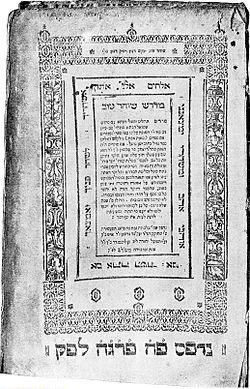
noun, plural mid·ra·shim [Sephardic Hebrew mee-drah-sheem; Ashkenazic Hebrew mi-draw-shim] /Sephardic Hebrew mi drɑˈʃim; Ashkenazic Hebrew mɪˈdrɔ ʃɪm/, mid·ra·shoth, mid·ra·shot, mid·ra·shos [Sephardic Hebrew mee-drah-shawt; Ashkenazic Hebrew mi-draw-shohs] /Sephardic Hebrew mi drɑˈʃɔt; Ashkenazic Hebrew mɪˈdrɔ ʃoʊs/.
- an early Jewish interpretation of or commentary on a Biblical text, clarifying or expounding a point of law or developing or illustrating a moral principle.
- (initial capital letter) a collection of such interpretations or commentaries, especially those written in the first ten centuries a.d.
noun plural midrashim (mɪˈdrɔʃɪm, Hebrew midraˈʃim) Judaism
- a homily on a scriptural passage derived by traditional Jewish exegetical methods and consisting usually of embellishment of the scriptural narrative
- one of a number of collections of such homilies composed between 400 and 1200 ad
 Liberal Dictionary English Dictionary
Liberal Dictionary English Dictionary